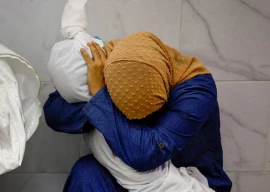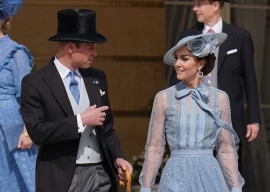
Partaking in the Pakistan Movement was of a great historical significance for Muslim women of the subcontinent who had never participated in such a great number in any political movement. It was a befitting culmination of the reformist trends of the late nineteenth century for emancipation of Muslim women finally becoming a tangible reality.
Much before than that, the Khilafat Movement of the 1920s had been the first instance when Muslim women had made their presence felt in the political arena. With Maulana Shaukat Ali and Muhammad Ali Johar in jail, their mother Bi Amman, had taken up the cudgels against British imperialism with assistance from her daughter-in-law. She addressed large meetings from behind the curtains and traveled to various parts of India to garner support.
Pakistan Movement, when born, followed a similar trend. Women came to symbolize the struggle for a separate homeland and made immense contributions to the effort through their enthusiasm for social uplift and by demonstrating qualities of leadership, sincerity, intellect, courage and resolve.
None of these deserves more mention than the sister of our founding father. Fatima Jinnah, later titled with Madar-e-Millat (Mother of the Nation), was the first lady to
have inspired and organized the women cadres for the idea of Pakistan, aiding Quaid-e-Azam greatly in the process.
At one point, Jinnah had asked Fatima to sit beside him at Sibi Darbar, the grand annual gathering of Baloch and Pakhtun chiefs and leaders. He, as on many occasions of his life, set an example: Muslim women must make their mark in the future make up of Pakistan and shall contribute to society when the country does come into existence.
After independence in 1947, these women formed bodies and organizations to establish platforms where they could exhibit their leadership qualities and initiate work towards achievement of their objectives.
Begum Jahan Ara Shah Nawaz and Begum Shaista Ikramullah represented women in the first Legislative Assembly of Pakistan. Out of their deep commitment to women’s rights, they managed inclusion of rights for women in the agenda of the constituent assembly and played an active role in formation of laws that would promote women’s rights and their participation in national affairs.
The Muslim Personnel Law of 1948, demands for special seats for women in 1956, Muslim Family Laws Ordinance 1961 and passing of Muslim Personnel Law under Constitution of 1962, all owe to persistent struggle of these exceptional ladies.
The most significant moment in the political history that assigns prominence to the political tenacity of women, was the decision of Fatima Jinnah to contest the presidential elections. It was a tough challenge meted out to the new political stalwarts of the country who tabooed women’s participation in politics with manifest vehemence. Although, Ayub Khan won the highly controversial elections, the impact had been sealed forever upon the political structure of the country.
In Bhutto’s time, women came to play a role in party politics as party wings for their participation were formed. They set out to achieve economic independence and became industrial entrepreneurs coupled with forming a significant part of the labor force too.
It must be remembered that women groups were the first to oppose Zia regime in public by staging massive protests. When Benazir came back to the country, women joined her ranks as enthusiastic supporters for ridding the country of dictatorship.
The election of Benazir as the first prime minster of any Muslim country testifies to the ardent struggle by the lot for achieving political and economic independence. The process may have started much earlier during the Khilafat Movement but it reached a befitting conclusion with Benazir’e election as the world’s youngest prime minister.
Published in The Express Tribune, August 14th, 2011.
COMMENTS (2)
Comments are moderated and generally will be posted if they are on-topic and not abusive.
For more information, please see our Comments FAQ



































































My Salute to all my Mothers and Sisters of Pakistan.Also Great Salute to these Women who took a Great Role in the movement of PAKISTAN till 1947. NOW WE NEED LOT OF PRAYERS OF YOUR'S AGAIN. WE ARE REALLY PROUD OF YOU ALL.
Why not mention the names of women who killed hundreds of Sikhs in riots? These feminists spare no opportunity to get points for "women's role" but fail to mention the heinous crimes of female gender.